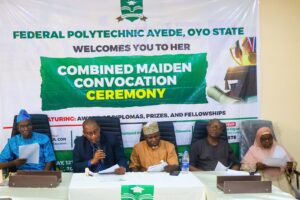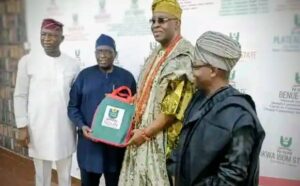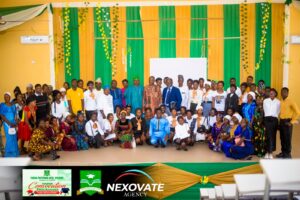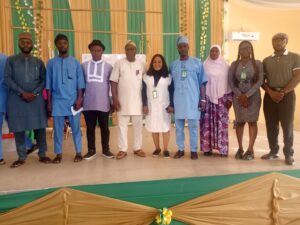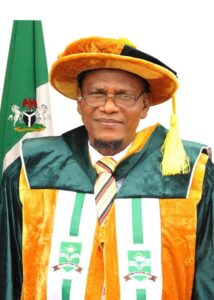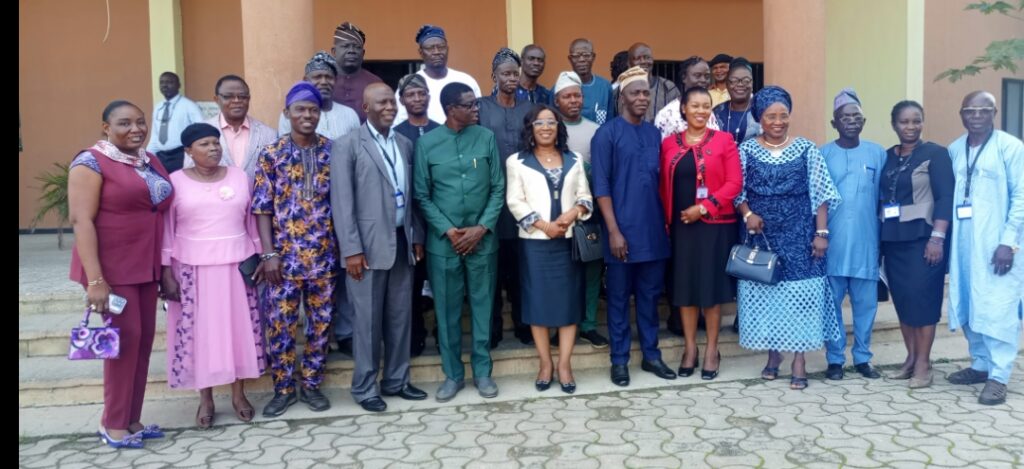
By Sunday Adepoju
Scholars, professionals, among others, have converged on Ogbomoso for the first ever LAUTECH International Conference of the Faculty of Environmental Sciences (tagged LICFES 2025) to raise stakes towards economic reforms and their impact on the sustainable built environment.
The four-day conference, held from Tuesday, October 14 to Friday, October 17, 2025, at the Ogbomoso Recreation Club, Oyo State, was organized by the Faculty of Environmental Sciences, Ladoke Akintola University of Technology (LAUTECH), Ogbomoso.
The maiden edition, themed “Economic Reforms and its Impacts on Sustainable Built Environment,” brought participants from academia, professional bodies, government agencies, and industrial experts from Nigeria and other African countries, including Liberia and South Africa.
The event featured a robust array of activities, including an opening ceremony with goodwill messages from the University Management led by the Vice-Chancellor, Prof. Rasaq Olatunde ROM Kalilu; five keynote presentations by renowned local and international experts such as Arc. Mobolaji Adeniyi, FNIA, 30th President of the Nigerian Institute of Architects (NIA); Prof. Kolapo Olusola-Eleka, former Deputy Governor of Ekiti State; Prof. Eziyi Offia Ibem from UNN; Dr. Ogunbayo Babatunde from Liberia; and Prof. James Chakwizira from South Africa.
In his remark as the Chairman of the event, the Vice Chancellor, Prof. Rasaq Olatunde ROM Kalilu, reresented by Deputy Vice Chancellor, Strategy and Development, Prof. Tunde Adepoju Ogunkunle, stressed on the need to address the myriads of challenges facing the planet such as environmental degradation, climate change, and unsustainable development.
Prof. Kalilu, who is also a member of the Faculty, precisely Department of Fine and Applied Art, said, “Economic reforms can have a great impact on the built environment as it will shape our design output, the way we build, and the policies we put in place in operating our cities and infrastructure.
“By exploiting economic incentives, policy instruments, and innovative financing structure, we can create more sustainable, resilient, and liveable cities.
In her opening remark, the institution’s Dean of the Faculty of Environmental Sciences, Prof. Margret O. Areo, maintained that sustainability of the built environment involves the ability to balance, maintain and uphold social, environmental and economic needs unhindered over a given period and time.
Prof. Areo added that the ideals and concept of sustainability are not only dynamic but also have the tendency to change from time to time.
The Chairman of the Local Organising Committee (LOC), Prof. Akeem A. Raheem, said, “This maiden Conference of the Faculty of Environmental Sciences, LAUTECH with the theme ‘Economic Reforms and Its Impact in Sustainable Built Environment’ is quite timely, taking into account the situation of our country. A total of 62 abstracts were received for the conference out of which 35 full papers were submitted and presented.
Five keynote speakers were carefully selected. And leading the pack was the 30th President of Nigerian Institute of Architects, Arc. Mrs. Mobolaji Adeola Adeniyi.
“The Nigerian Institute of Building (NIOB) is powerfully represented by His Excellency, Bldr. Prof. Kolapo Olusola-Eleka, former Deputy Governor of Ekiti State.
“We also have Prof. Eziyi Offia Ibem from University of Nigeria, Nsukka. Two international keynote speakers also presented their papers virtually. They are Prof. James Chakwizira from South Africa and Dr. Ogunbayo Babatunde Williams from Liberia.
The conference also included technical sessions across disciplines such as Architecture, Estate Management, Urban and Regional Planning, Fine and Applied Arts, Building Technology, Quantity Surveying as well as exhibitions, networking events, and an award night/dinner.
In its communiqué, the conference observed that the built environment remains central to economic reform, climate resilience, and social well-being across Africa.
However, it noted that there is still a significant gap between academic research and the practical implementation of sustainable policies in Nigeria’s construction and real estate sectors.
It also emphasised the underutilisation of technological innovations such as geospatial mapping, prefabrication, and remote sensing in national development, calling for stronger interdisciplinary collaboration among professionals and policymakers to bridge the gaps.
The conference resolved that governments at all levels should integrate research findings from built environment experts into national policies, promote sustainable design and green construction practices, and provide incentives for public-private partnerships in infrastructure development.
It further recommended capacity building in universities and professional institutions, regional collaboration among African nations, and the adoption of zero-emission transport systems to reduce environmental impact.
The participants commended the Vice-Chancellor, Prof. Kalilu; the Conference Chairperson, Prof. M. O. Areo; and the Local Organizing Committee led by Prof. Akeem A. Raheem for their dedication and leadership in ensuring the success of LICFES 2025.
The conference reaffirmed its collective commitment to promoting sustainable, inclusive, and resilient infrastructure development across Africa, with future editions of LICFES expected to deepen the discourse and strengthen collaboration between academia and industry toward a greener and more sustainable built environment.
Prof. Raheem of the Department of Building, also commended the effort of his team, LOC which included: Prof. Mrs. O. Abolade, Urban and Regional Planning; Prof. E. A. Olugbade, Fine and Applied Art; Prof. J. O. Ige, Surveying and Geoinformatics; Dr. N. A. Bello, Estate Management; Dr. O. Z. Oni, Building and Dr. O. O. Makinde – LOC Secretary.

